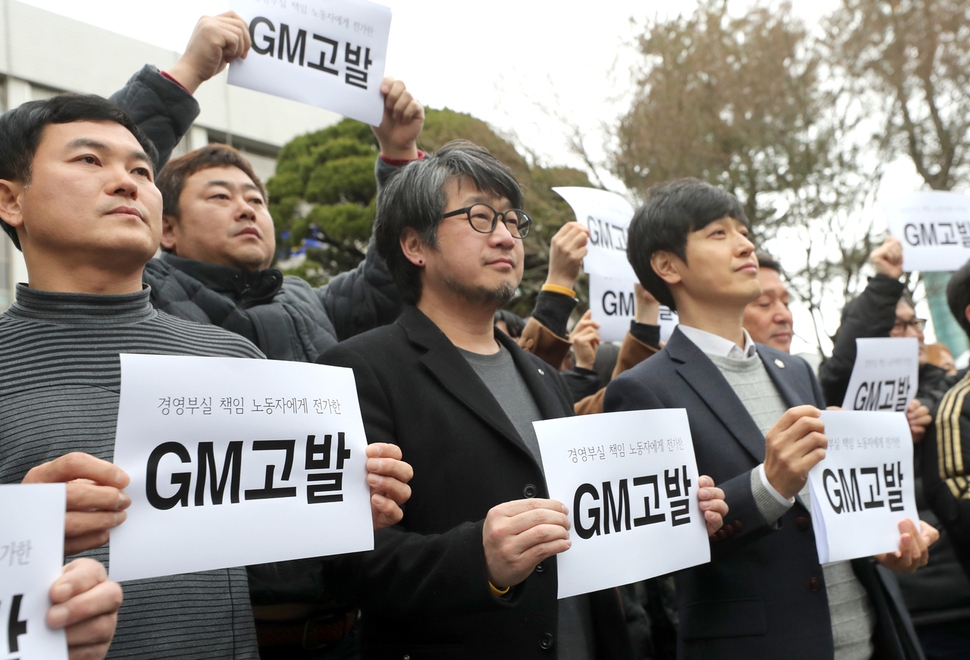 |
|
The “Gunsan Citizens’ Accusers Group Calling for the Investigation of the GM Korean Board of Directors” holds a demonstration outside of the Gunsan District Public Prosecutors Office on Mar. 5 to demand a prosecutorial investigation of GM Korea’s decision to close its Gunsan factory. (Yonhap News)
|
Potential remains for the company to exit the Korean market if it deems government support insufficient
The normalization of operations at GM Korea is poised to clear a major hurdle with the launch of a Korea Development Bank (KDB) due diligence inspection this week, but the future prospects for GM’s subsidiary remain uncertain. In addition to the failure to cleanly resolve differences surrounding the scope and procedures for the inspection, doubts remain about the head office’s real intentions, which are seen as the most important gauge for GM Korea’s recovery. According to accounts on Mar. 11 from the Ministry of Trade, Industry and Energy (MOTIE), KDB, and GM Korea, GM International president Barry Engle visited South Korea on Mar. 7–9 to once again meet with South Korean government officials. During the meeting, Engle voiced his hopes for a swift inspection and for cooperation and concessions from stakeholders, adding that he would soon make an investment pledge. The most notable development was an agreement with KDB, which is set to begin its due diligence inspection of GM Korea this week. KDB announced that plans to “go ahead with the inspection while continuing to hold future discussions on our differences.” GM reportedly plans to submit a request shortly for the designation of GM workplaces as overseas investment regions. But skepticism over GM’s intentions remains. According to GM Korea, Engle’s recent visit had two aims: to quickly resolve the delay in the KDB investigation and address labor-management collective bargaining on wages in order to move on to the next stage of assigning new models. In other words, GM could be seen as planning to withdraw its new model assignment plans and pursue additional restructuring if its idea of “progress” is not achieved. Experts agreed the potential remains for GM to follow through on its withdrawal threats in South Korea as it has with other global workplaces to date. Once KDB begins its due diligence inspection, the potential remains for setbacks due to disagreements with GM. KDB appears likely to focus on ascertaining the production cost structure, which has been cited as a factor in GM Korea’s underperformance. In particular, it plans to investigate production cost factors including money borrowed from the head office, maintenance fees paid to the head office, technology usage and personal fees, and transfer costs (expenses for transactions among global subsidiaries). But while GM has agreed to the inspection, it has yet to produce some of the related data. For this reason, some contend that if GM wishes to appear responsible as major shareholder, it should first declare what it plans to do about GM Korea loans coming due at the end of this month. GM Korea is currently scheduled to repay 722 billion won (US$679 million) in loans to the head office by the end of March and another 988 billion won (US$929 million) by early April. Cash-strapped at the moment, it will face bankruptcy if it cannot receive extensions or additional loans. “GM’s sincerity is in question, given the way it’s told the government it will assign new models if it’s given tax breaks while pressuring the union with claims that it ‘can’t assign new models without some concessions,’” said Dang Seong-geun, head of the education and publicity office for the GM Korea chapter of the Korean Metal Workers’ Union. While the two sides may yet reach an agreement, talks between GM and the South Korean government are expected to continue through the end of KDB’s inspection. “There are a number of difficult issues that will need to be resolved before we confirm GM’s intentions,” a South Korean government source said. “The standards for determining whether to provide support include whether GM’s self-rescue plan is a realistic alternative for normalizing GM operations and whether it lives up to its responsibility and role as majority shareholder.” By Hong Dae-sun and Choi Ha-yan, staff reporters Please direct questions or comments to [english@hani.co.kr]






